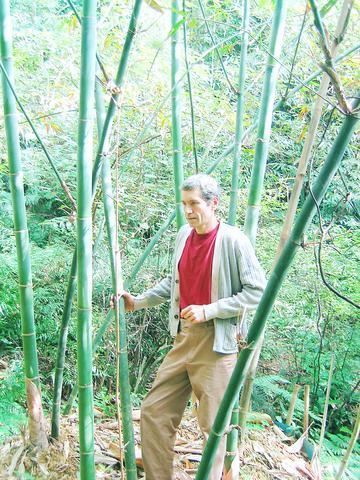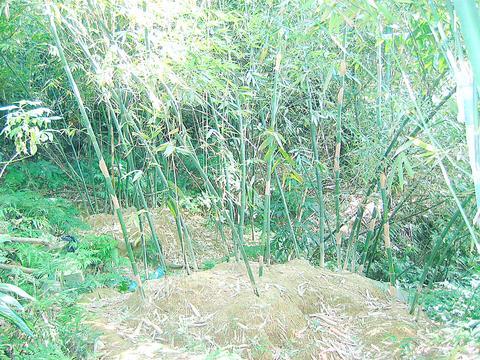Expat and International Primate Protection League representative John Spowart got more then he bargained for last weekend when his amiable afternoon saunter through the woods close to his home at the foot of Taipei's popular forest park, Four Beasts Mountain (四獸山), turned into confrontation with illegal bamboo farmers.
Having lived in the Sungshan District (松山區) adjacent to the park for almost five years, Spowart has witnessed a steady rise in the number of illegal bamboo plots in the area. Groves the size of basketball courts have replaced large tracts of land that were once rich in flora. It was only last weekend, however, that Spowart had come face to face with a couple of the perpetrators.

PHOTO: GAVIN PHIPPS, TAIPEI TIMES
The British national's polite inquiries in regards the legality of felling trees and clearing large tracts of land in the area he knew to be part of the Taipei City Government-administered park were initially met by a flurry of insults followed by something along the line of, "What's it got to do with you?"

"They were annoyed at my presence and figured it was none of my business. But as I pointed out to them, I was on a public footpath and it was in fact them who had no business being there felling trees and planting bamboo," Spowart said. "It all got a bit heated. I kept asking them about their rights to plant bamboo here. Of course, they didn't have answers to this. I went to call the park authorities and they buggered off."
Along with betel nut palms, bamboo can be one of the most destructive of the harvested plants found in Taiwan. The root system releases toxins into the surrounding earth that kills anything attempting to grow and its canopy denies other flora the sunlight it needs to continue to thrive. One 2m bamboo plant can effectively destroy an area of 1.5m2 of land.
"People plant it because they know it doesn't need tending and grows quickly. It's a relatively easy cash crop to grow and one that is popular with people who have access to land and are looking to make extra money," said Hu Jer-ming (胡哲明), assistant professor at the National Taiwan University Department of Botany. "The effects of bamboo on the natural environment aren't as widely publicized as that of betel nut palms, but it is just as devastating."
"It's a big problem in the Taipei area. They [illegal farmers] figure that because the land is empty and not used by anybody that they can use it for their own needs," said Tsao Fu-chung (曹福忠) of the Taipei City Government's Department of Economic Development (台北市政府建設局). "We get dozens of calls every years from people like Spowart who discover illegal farms on land in Taipei. Of course, many more people ignore it, which is a pity as this only leads to more land being enveloped by the `farmers.'"
The problem of illegal bamboo groves within Taipei City's environs is not limited to Four Beasts Mountain. The problem is endemic on Yangmingshan (陽明山), especially in the Peitou area as well as in the areas around Neishungxi (內雙溪). Because of the large areas of land involved it is impossible for people such as Tsao to adequately monitor the area without public support.
As part of its ongoing environmental awareness programs, Taipei City Government's Department of Economic Development encourages people who discover illegal farms on government and public land to inform them. But though the city government sends a team of land specialists to every site where illegal farming is reported and erects signs informing would-be farmers of the illegality of using the land to cultivate crops, few of the unlawful farmers are prosecuted. Catching the unscrupulous cultivators in the act rarely, if ever happens according to the Council of Agriculture (行政院農業委員會).
"On a national scale the problem of illegal farming in Taipei is pretty small, yet it's still damaging," said a spokesperson for the Council of Agriculture. "A lot of the illegal farming takes place at night. These guys know that no one will bother them then. Even if people do stumble across them very few bother tell the authorities."
At present those caught cultivating crops illegally face a maximum fine of NT$600,000, or from between six months and five years imprisonment. While the city government program is proving moderately successful, many feel the number of calls needs to increase drastically if the problem is to be dealt with on a scale that will make a difference and deter would-be illegal bamboo farmers. Until then, however, it looks as if environmentalists such as Spowart are facing an uphill battle.
"The hills around Taipei are beautiful and have a pretty high density of species, which is good news for all of us. But if profit- motivated individuals are allowed to destroy it the impact will be felt right across the board," Spowart said. "I hope the city government can do something to enforce its own laws. It needs regular monitoring and a lot more citizen involvement."

On April 26, The Lancet published a letter from two doctors at Taichung-based China Medical University Hospital (CMUH) warning that “Taiwan’s Health Care System is on the Brink of Collapse.” The authors said that “Years of policy inaction and mismanagement of resources have led to the National Health Insurance system operating under unsustainable conditions.” The pushback was immediate. Errors in the paper were quickly identified and publicized, to discredit the authors (the hospital apologized). CNA reported that CMUH said the letter described Taiwan in 2021 as having 62 nurses per 10,000 people, when the correct number was 78 nurses per 10,000

As we live longer, our risk of cognitive impairment is increasing. How can we delay the onset of symptoms? Do we have to give up every indulgence or can small changes make a difference? We asked neurologists for tips on how to keep our brains healthy for life. TAKE CARE OF YOUR HEALTH “All of the sensible things that apply to bodily health apply to brain health,” says Suzanne O’Sullivan, a consultant in neurology at the National Hospital for Neurology and Neurosurgery in London, and the author of The Age of Diagnosis. “When you’re 20, you can get away with absolute

May 5 to May 11 What started out as friction between Taiwanese students at Taichung First High School and a Japanese head cook escalated dramatically over the first two weeks of May 1927. It began on April 30 when the cook’s wife knew that lotus starch used in that night’s dinner had rat feces in it, but failed to inform staff until the meal was already prepared. The students believed that her silence was intentional, and filed a complaint. The school’s Japanese administrators sided with the cook’s family, dismissing the students as troublemakers and clamping down on their freedoms — with

As Donald Trump’s executive order in March led to the shuttering of Voice of America (VOA) — the global broadcaster whose roots date back to the fight against Nazi propaganda — he quickly attracted support from figures not used to aligning themselves with any US administration. Trump had ordered the US Agency for Global Media, the federal agency that funds VOA and other groups promoting independent journalism overseas, to be “eliminated to the maximum extent consistent with applicable law.” The decision suddenly halted programming in 49 languages to more than 425 million people. In Moscow, Margarita Simonyan, the hardline editor-in-chief of the